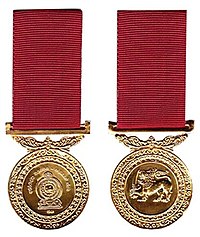Parama Weera Vibhushanaya
This article includes a list of general references, but it lacks sufficient corresponding inline citations. (December 2023) |
| Parama Weera Vibhushanaya | |
|---|---|
 Medal, obverse (right) and reverse (left) | |
| Type | Medal |
| Awarded for | "individual acts of gallantry and conspicuous bravery of the most exceptional order in the face of the enemy" |
| Presented by | President of Sri Lanka |
| Eligibility | Persons of any rank in the Sri Lankan regular or volunteer forces of the Army, Navy and Air Forces |
| Post-nominals | PWV |
| Status | Currently awarded |
| Established | 1981 |
| First awarded | 1991 |
| Last awarded | 2016 |
| Total | 31 |
| Total awarded posthumously | 31 (including awards to MIA personnel later declared KIA) |
| Total recipients | 31 |
| Precedence | |
| Next (higher) | None (Highest) |
| Next (lower) | Weerodara Vibhushanaya (Non-combat) |
| Related | Uththama Pooja Pranama Padakkama |
The Parama Weera Vibhushanaya (PWV) (Sinhala: පරම වීර වීභූෂණය parama vīra vibhūṣaṇaya; Tamil: பரம வீர விபுஷனைய) is Sri Lanka's highest military decoration, awarded for acts of exceptional valour in wartime. Parama Weera Vibhushanaya translates as the "Order of the Supreme Valour", and the award is granted for "individual acts of gallantry and conspicuous bravery of the most exceptional order in the face of the enemy". Corporal Gamini Kularatne, was the first recipient. As of January 2021[update], the medal has been awarded 31 times, of which all were posthumous and arose from actions in the Sri Lankan Civil War. Of the 31 awardees, 28 have been from the Sri Lanka Army, two have been from the Sri Lanka Navy and one has been from the Sri Lanka Air Force.
Ceylon used the British awards system and continued post-independence until 1956, when British imperial honours were suspended. New awards were instituted in 1981. PWV is equivalent to the Victoria Cross in the United Kingdom, the Medal of Honor in the United States and Param Vir Chakra in India.
History
[edit]From its formation the Ceylon Defence Force used British military decorations. The practice was continued after Ceylon gained independence in 1948 and the formation of the Ceylon Army in 1949, the Royal Ceylon Navy in 1950, and the Royal Ceylon Air Force in 1951. Following up on his election promise, S. W. R. D. Bandaranaike suspended imperial honours. This meant only service medals such as the Ceylon Armed Services Long Service Medal, the Efficiency Decoration (Ceylon) and the Efficiency Medal (Ceylon) were awarded. No gallantry medals were award during the 1971 JVP Insurrection. In 1972, Ceylon became a republic as the Republic of Sri Lanka. On 1 September 1981, President J. R. Jayewardene instituted new Sri Lankan awards for gallantry the Parama Weera Vibhushanaya (PWV), Weerodara Vibhushanaya (WV), Weera Wickrama Vibhushanaya (WWV), Rana Wickrama Padakkama (RWV), and the Rana Sura Padakkama (RSP) by the Gazette Extraordinary No. 156/5 of 1982.
Authority and privileges
[edit]As the highest award for valour in Sri Lanka, Parama Weera Vibhushanaya is always the first award to be presented at an awards ceremony by the President of Sri Lanka which includes the medal and a sanasa (award scroll). Recipients of the decoration can use the post-nominal letters "PWV" and it is always the first decoration worn in a row of medals and it is the first set of post-nominal letters used to indicate any decoration. Since all awards have been posthumous no tradition exists that require "all ranks to salute a bearer of the Parama Weera Vibhushanaya", nor does it provide for any annuity or monitory benefits for the recipient or next of kin other than statuary pension or WNOP pension as with other similar awards such as the Victoria Cross.
Award process
[edit]The medal can be awarded to all ranks of the tri services, to both regular and volunteer forces, in recognition of:
...individual acts of gallantry and conspicuous bravery of a non-military nature of the most exceptional order performed voluntarily with no regard to his own life and security with the objective of saving or safeguarding the life or lives of a person or personnel imperiled by death or for a meritorious act or a series of acts of a humane nature of an exceptional order displayed in saving life from drowning, fire and rescue operations in mines, floods and similar calamities under circumstances of grave bodily injury or great danger to the life of the rescuer...
— [1]
Field commanders report actions that fulfill the conditions for a PWV to their respective service commanders, who review these reports and, if satisfactory, forward an official recommendation to an awards board composed of officers from the three armed services branches for further review. The board's report is sent to the office of the President who, as commander in chief, has final authority on the award.
As of 2018, all recipients of this award were killed or missing in action- no living serviceperson has ever worn the medal or the ribbon bar, or used the post-nominal letters to date, effectively making the PWV an exclusively posthumous award.
Recipients
[edit]References
[edit]- ^ "Medals". Sri Lanka Army. army.lk. Retrieved 29 September 2017.
- ^ "PWV Citation – S/198852 Rec Abeyrathnebanda A. M. B. H. G. 21 SLSR (Posthumous)" (PDF). The Ministry of Defence of Sri Lanka. Archived from the original (PDF) on 4 March 2016. Retrieved 24 March 2013.
- ^ a b c "Acts of Bravery Rewarded with Gallantry Medals in Glittering Ceremony". Sri Lanka Army. 27 October 2016. Retrieved 16 July 2017.
- Army, Sri Lanka. (1st Edition - October 1999). "50 YEARS ON" - 1949-1999, Sri Lanka Army ISBN 955-8089-02-8
- Sri Lankan military awards and decorations



